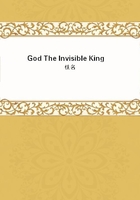
第2章 PREFACE(2)
Let him add only one other note of explanation in this preface, and that is to remark that except for one incidental passage (in Chapter IV., 1), nowhere does he discuss the question of personal immortality. [It is discussed in "First and Last Things," Book IV, 4.] He omits this question because he does not consider that it has any more bearing upon the essentials of religion, than have the theories we may hold about the relation of God and the moral law to the starry universe. The latter is a question for the theologian, the former for the psychologist. Whether we are mortal or immortaea of this book very roughly, these two antagonistic typical conceptions of God may be best contrasted by speaking of one of them as God-as-Nature or the Creator, and of the other as God-as-Christ or the Redeemer. One is the great Outward God; the other is the Inmost God. The first idea was perhaps developed most highly and completely in the God of Spinoza. It is a conception of God tending to pantheism, to an idea of a comprehensive God as ruling with justice rather than affection, to a conception of aloofness and awestriking worshipfulness. The second idea, which is opposed to this idea of an absolute God, is the God of the human heart. The writer would suggest that the great outline of the theological struggles of that phase of civilisation and world unity which produced Christianity, was a persistent but unsuccessful attempt to get these two different ideas of God into one focus. It was an attempt to make the God of Nature accessible and the God of the Heart invincible, to bring the former into a conception of love and to vest the latter with the beauty of stars and flowers and the dignity of inexorable justice. There could be no finer metaphor for such a correlation than Fatherhood and Sonship. But the trouble is that it seems impossible to most people to continue to regard the relations of the Father to the Son as being simply a mystical metaphor. Presently some materialistic bias swings them in a moment of intellectual carelessness back to the idea of sexual filiation.
And it may further be suggested that the extreme aloofness and inhumanity, which is logically necessary in the idea of a Creator God, of an Infinite God, was the reason, so to speak, for the invention of a Holy Spirit, as something proceeding from him, as something bridging the great gulf, a Comforter, a mediator descending into the sphere of the human understanding. That, and the suggestive influence of the Egyptian Trinity that was then being worshipped at the Serapeum, and which had saturated the thought of Alexandria with the conception of a trinity in unity, are probably the realities that account for the Third Person of the Christian Trinity. At any rate the present writer believes that the discussions that shaped the Christian theology we know were dominated by such natural and fundamental thoughts. These discussions were, of course, complicated from the outset; and particularly were they complicated by the identification of the man Jesus with the theological Christ, by materialistic expectations of his second coming, by materialistic inventions about his "miraculous" begetting, and by the morbid speculations about virginity and the like that arose out of such grossness. They were still further complicated by the idea of the textual inspiration of the scriptures, which presently swamped thought in textual interpretation. That swamping came very early in the development of Christianity. The writer of St. John's gospel appears still to be thinking with a considerable freedom, but Origen is already hopelessly in the net of the texts. The writer of St. John's gospel was a free man, but Origen was a superstitious man. He was emasculated mentally as well as bodily through his bibliolatry. He quotes; his predecessor thinks.